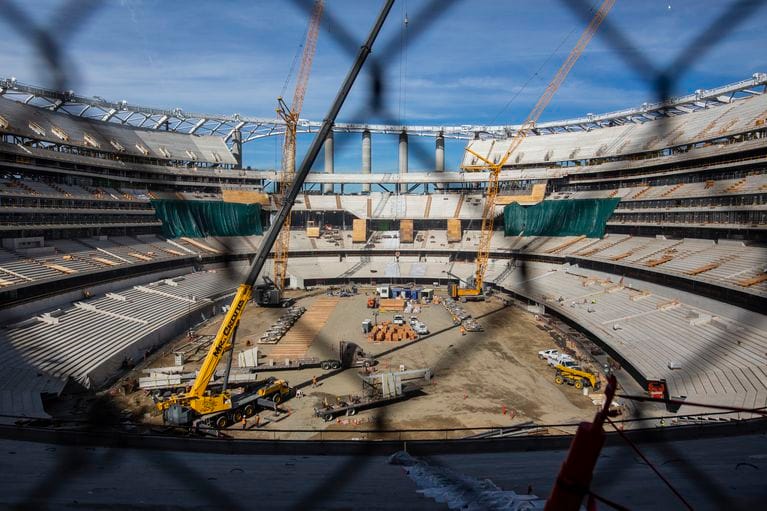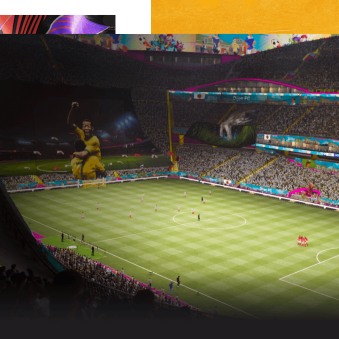Royals Hall of Fame
Project Group
Client
Date
Location
Kansas City Royals Hall of Fame, Kansas City, MOOther Media
Tags
3D modeling, Animation, Generative graphics, Games, InstallationsPlaylists
- 3-D reconstructions & visualizations
Visitors manipulate a 3-D model of Kauffman Stadium in real time, learning about the design process while creating unique ballparks they can send to themselves via e-mail.
Using advanced graphics capabilities, this dual-screen interactive allows visitors to modify an architectural model of Kauffman stadium using interactive tools on a touch-screen interface. As visitors easily move between different key building considerations, such as outfield wall distance and scoreboard configurations, dynamic benchmarks give feedback on how their decisions affect revenue, attendance, home runs, or other factors. Through supplemental images and interpretive text, visitors learn how the various aspects of a ballpark are strategically considered by architects in their designs and by baseball players as they try to play each park to their best advantage. When they are satisfied with their design, visitors can email an image of their final ballpark to themselves, family members, or friends. A supplemental documentary, which tells the story of the making of Royals Stadium in the late 1960s, adds a historical note to the experience.
Press & Awards
“Guide, Motivate, and Engage the User,”Interactive Design: An Introduction to the Theory and Application of User-Centered Design, Andy Pratt & Jason Nunes, October 2012The product had to be deep enough for users to learn about the ballpark design process, but also simple and engaging enough for them to have fun and feel successful at it. To accomplish this, fans are guided through several small steps. Each decision generates real-time feedback, so that users can quickly see the implications of their choices.
HOW, Interactive Design Awards, BEST OF SHOW, 2011Most impressive to me is how well-executed this project is, especially considering the complexity and challenges that must have existed,” says juror Michael Ferdman. “The experience is equally as seamless as it is engaging.
I.D., Annual Design Review, Honorable Mention, 2010Communication Arts, Interactive Design Annual, Experimental, 2010You immediately know that any kids who love baseball will spend as much time playing with this as their parents will allow. Mission accomplished
Credits
- Designer
- Christian Bannister
- 3-D Animation
- Matt Arnold
- Technology Director
- Thomas Wester
- Lead Integration Engineer
- Matt Arnold
- Developers
- Vance Feldman, Matt Arnold
- Producer
- Erica Dillon
- Production Artist
- Rebecca Rosen
- Quality Assurance
- Heather Daniel, Nina Pavlich
- Video Design
- Real Media
- A/V Integration
- Edwards Technologies Inc.
- Exhibit Design
- Populous
© 2021 Second Story, Inc.Project Group
- Design Your Own Ballpark

Create your fantasy football league game. Create a single league - Select name, password, number of teams. Select 1 or 2 rounds (teams will play once or twice against every team). Select type of competition (league, cup, world cup format.). As well select if. Footballiser combines elements of games of skill, strategy and chance, along with the world of club teams and national teams. As a Football Club Owner in the game, you can build your own stadium and develop your team whilst playing exciting matches with various national teams. Perfect for children over 8! The old Fifa manager series had a create your own stadium mode when you started your own club, was pretty detailed iirc. Also on Football Manager, as of next year's edition it will be available in Germany as they've finally got the right licences, and although it is an amazing game, it doesn't let you design your own stadium.
'This well-executed application is great way to build community advocacy for a public building project. It engages fans of both sports and architecture through interaction with the design process.' —juror Ingrid Bernstein
'You immediately know that any kids who love baseball will spend as much time playing with this as their parents will allow. Mission accomplished.' —juror Mathew Ranauro

Overview: A capstone to the 2009 renovations of Kauffman Stadium, the Royals Hall of Fame provides ballpark visitors with a multimedia-rich view of Kansas City baseball. Using advanced graphics capabilities, this dual-screen interactive allows visitors to manipulate a 3-D architectural model of Kauffman Stadium using interactive tools on a touchscreen interface. As visitors move between key building considerations, such as outfield wall distance and scoreboard configurations, dynamic benchmarks give feedback on how their decisions affect revenue, attendance, home runs and other factors. Through supplemental images and text, visitors learn how various aspects of a ballpark are strategically considered by architects and by baseball players as they try to play each park to their best advantage.
• The project was in the studio for one year and in production for four months.
• The interactive leveraged heavily on the strengths of both C# and ActionScript code bases. The 3-D graphics and ballpark visualization use the Tao OpenGL library. As a result, Microsoft DotNet and Tao libraries need to be installed to run the application. Adobe Flash was employed for the touchscreen user interface.
• The technology in the program lets visitors make real changes to a completely interactive model that is rendered in real time.
Create Your Own Football Stadium Online Game
Comments by Christian Bannister and Matt Arnold:
What was the most challenging aspect of the project? 'It required a great deal of experience planning and wireframing. We didn't want to build a 3-D ballpark with specific features only to find that we had to throw out certain features because they weren't fitting into the experience or weren't accurate in some way. We had to present very detailed wireframes to the architect on multiple occasions and also had to wireframe in tandem to the early development efforts in order to learn more about what would be possible.'

Build Your Own Stadium Online

How did this project compare with others you've worked on in the past? 'It's unique in that it allows the visitor to shape something of their very own, with the results being presented to larger group of people in real-time. There are two screens—a large overhead screen displays the rotating 3-D ballpark and a lower screen holds the tools for shaping it. It's a unique configuration. We've worked on a number of screen combinations, but never have we had this particular social dynamic.'
Were there any specific demands that made the project easier or harder? 'We had to make sure that visitors would keep moving through the space, that this somewhat complicated experience would wrap within a fixed amount of time and that the space would not bottleneck at the interactive. We couldn't include everything we had initially envisioned because the experience would have been too long. It was tough letting go of some of the features that we came up with in the concept phase of the project.'
Comments are closed.